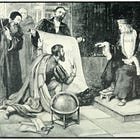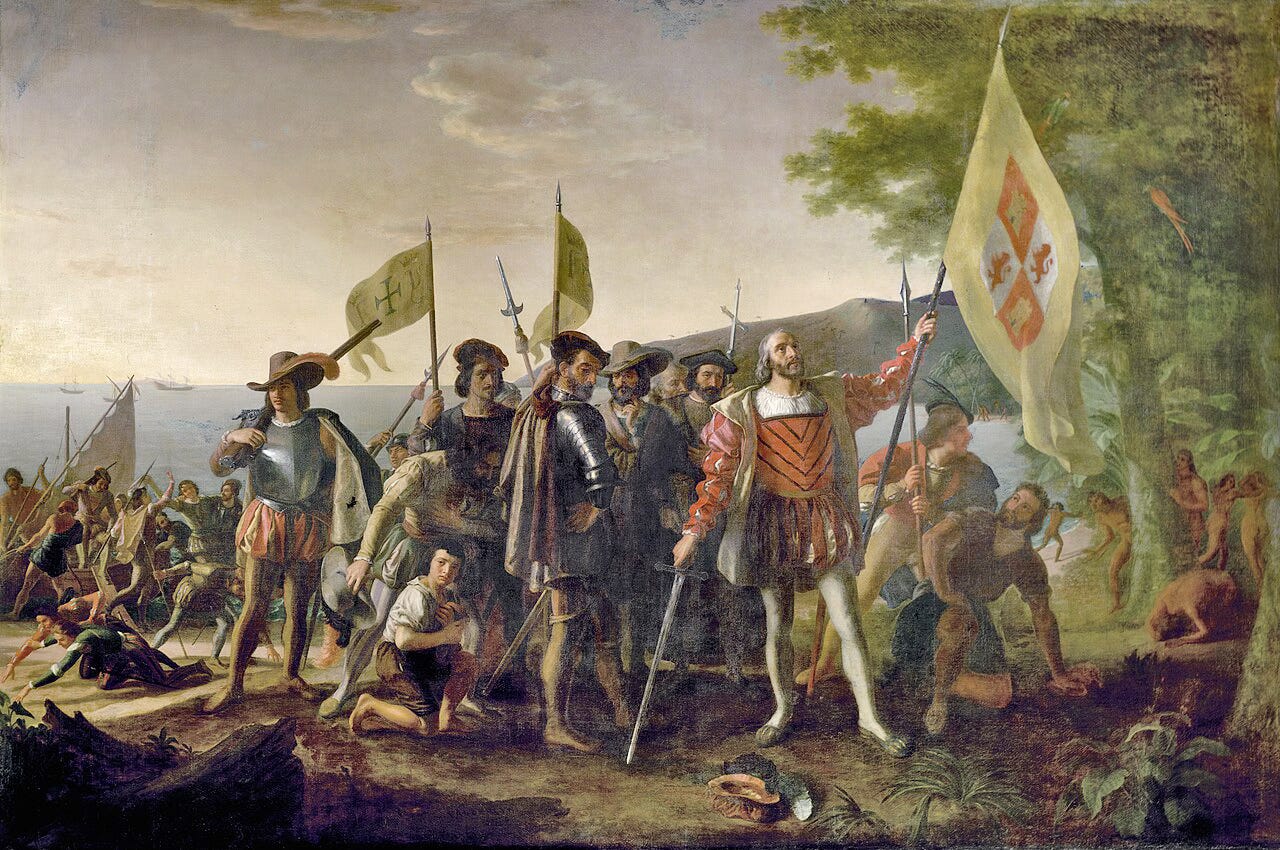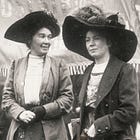Today in history: October 10
First contact, a devastating storm, and the winds of change…
This week’s little stories from contemporary historical sources…
A new world, 1492
Only a few weeks ago, I mentioned a notorious mutiny faced by a famous explorer. Now we go back more than a century earlier for another – well, nearly.
It’s fourteen hundred and ninety-two, and Columbus is sailing the ocean blue. The legendary Italian voyager (not Spanish, but working for them) is on his way westward in the hope of finding a new way to India, China and the Spice Islands of eastern Asia – but instead he finds what became known as the West Indies.
Columbus actually kept a journal of this first voyage, which made it home to Queen Isabella of Castile, but both this original and a copy that his grandson had (which he possibly sold to fund his lifestyle) have been lost to history. The closest version we have, then, is a summary compiled by Spanish priest, historian and lawyer Bartolomé de las Cases (who was only six years old when Columbus undertook this first of four trips across the Atlantic).1 Hence the brevity of the entry Las Casas records for October 10th 1492 on the crew getting twitchy:
The Admiral sailed west-south-west, at the rate of ten miles an hour and occasionally twelve, and at other times seven, running between day and night fifty-nine leagues; he told the men only forty-four. Here the crew could stand it no longer; they complained of the long voyage, but the Admiral encouraged them as best he could, giving them hopes of the profits that they might have. And he added that it was useless to murmur because he had come in search of the Indies, and was going to continue until he found them with God’s help.
Somehow Columbus managed to quell those mutinous thoughts, and only the next day they saw the first signs of land. And on October 12th, the New World (well, this little bit of it) opened up before them, as Las Casas reports:
Two hours after midnight the land appeared, about two leagues off… They soon saw people naked, and the Admiral went on shore in the armed boat… As soon as they had landed they saw trees of a brilliant green abundance of water and fruits of various kinds.
And according to Las Casas, these are Columbus’s own words about this first contact:2
In order to win the friendship and affection of that people, and because I was convinced that their conversion to our Holy Faith would be better promoted through love than through force, I presented some of them with red caps and some strings of glass beads which they placed around their necks, and with other trifles of insignificant worth that delighted them and by which we have got a wonderful hold on their affections. They afterwards came to the boats of the vessels swimming, bringing us parrots, cotton thread in balls, and spears, and many other things, which they bartered for others we gave them, as glass beads and little bells. Finally they received everything and gave whatever they had with good will. But I thought them to be a very poor people. ...
The people are totally unacquainted with arms, as your Highnesses will see by observing the seven which I have caused to be taken in. With fifty men all can be kept in subjection, and made to do whatever you desire.
And so the colonial project began (and not really more “through love than force”).
See also…
Universal desolation, 1780
Fast-forward nearly 300 years, and history brings us again to the Caribbean – this time to witness the deadliest hurricane ever recorded in the western hemisphere.
Various survivors of this devastating tropical cyclone recorded their experiences. The dramatic account that follows is recorded as the ‘Copy of a Journal of what passed at Barbados, from the 9th of October until the 16th, 1780’ among papers sent by Major General James Cunningham, then governor of Barbados, and it’s possible he was its author, or at least it must have been someone close to him. Here is just a short extract to convey the terror of the tempest:
The evening preceding the hurricane, the 9th of October, was remarkably calm, but the sky surprisingly red and fiery; during the night much rain fell. On the morning of the 10th much rain and wind from north-west. By ten o’clock it increased very much; by one, the ships in the bay drove; by four o’clock, the Albemarle frigate (the only man-of-war here) parted her anchors and went to sea, as did all the other vessels… Soon after, by six o’clock, the wind had torn up and blown many trees, and foreboded a most violent tempest.
At the Government House every precaution was taken to guard against what might happen: the doors and windows were barricaded up, but it availed little. By ten o’clock the wind forced itself a passage through the house from north-north-west, and the tempest increasing every minute, the family took to the centre of the building, imagining from the prodigious strength of the walls, they being three feet thick, and from its circular form, it would have withstood the wind’s utmost rage: however, by half-past eleven o’clock they were obliged to retreat to the cellar, the wind having forced its way into every part, and torn off most of the roof. From this asylum they were soon driven out, the water being stopped in its passage, and having forced itself a course into the cellar… the only chance left, was making for the fields, which at that time appeared equally dangerous… The Governor and the few who remained were thrown down, and it was with great difficulty they gained a cannon, under the carriage of which they took shelter; their situation here was highly deplorable: many of the cannon were moved, and they had reason to fear that under which they sat might be dismounted, and crush them by its fall; or that some of the ruins that were flying about, would put an end to their existence…
Anxiously did they wait the break of day, flattering themselves that with the light they should see a cessation of the storm; yet when it appeared, little was the tempest abated, and it served but to exhibit the most melancholy prospect imaginable. Nothing can compare with the terrible devastation that presented itself on all sides; not a building standing; the trees, if not torn up by the roots, deprived of their leaves and branches; and the most luxuriant spring changed, in this one night, to the dreariest winter. In vain was it to look round for shelter; houses that, from their situation, it was to have been imagined would have been in a degree protected, were all flat with the earth; and the miserable owners, if they were so fortunate as to escape with their lives, were left without a covering for themselves and family… Nothing has ever happened that has caused such universal desolation.
Desolation indeed – in the course of that week, somewhere between twenty and thirty thousand people lost their lives.
Deeds, not words, 1903
A very different type of storm now, and one that grew much more slowly, with its roots back in the mid-19th century: the campaign for British women to have the vote. It was on October 10th in 1903 that Emmeline Pankhurst (née Goulden, 1858–1928) gathered a group of women to start a new movement – one which forcibly campaigned through many forms of direct action as well as political lobbying, and would become synonymous with the label ‘suffragettes’.3
There’s no definitive list of who was there at the first meeting at 62 Nelson Street, though we do have this rather terse description from Emmeline’s own memoir, My Own Story, written in 1914:
It was in October, 1903, that I invited a number of women to my house in Nelson street, Manchester, for purposes of organisation. We voted to call our new society the Women’s Social and Political Union, partly to emphasise its democracy, and partly to define its object as political rather than propagandist. We resolved to limit our membership exclusively to women, to keep ourselves absolutely free from any party affiliation, and to be satisfied with nothing but action on our question. Deeds, not words, was to be our permanent motto.
That first meeting appears, in fact, to have mainly been a family affair: aside from Emmeline, her three daughters Christabel (then 23), Sylvia (21) and Adela (18) were certainly there. And in fact Christabel – who we’ve met close up here before:
– also made note of the event in her own memoir, Unshackled:4
“Women,” said Mother on a memorable occasion, “we must do the work ourselves. We must have an independent women’s movement. Come to my house tomorrow and we will arrange it!”
Next day a little group assembled, mostly wives of Labour men; women of character and personality. We resolved ourselves into the Women’s Social and Political Union, on an independent non-party, non-class foundation. Neither Mother nor I held any office. We did not want the Pankhurst name to appear lest the Union be discounted as ‘just Mrs. Pankhurst and Christabel’ and dubbed ‘a family party’. Later on, when the W.S.P.U. grew to be a power in the land, it mattered not what anyone called it…
W.S.P.U. business was done at weekly meetings and all present subscribed what they could to the funds. Mother supplied the rest of the money needed. Militancy was not part of the programme in those early days. Our work was still entirely peaceful and educational, being designed to prove to the public women’s need of the vote and to rouse women to insist that the political parties, including the new Labour Party, should take practical and speedy action in our cause.
That ‘peaceful’ start would change, of course – and in 1918, the first form of enfranchisement for women was finally achieved (but only for property owners over 30). Sadly it took until July 2nd 1928 for that to be extended to all adult women – and Emmeline had died less than three weeks beforehand. So it goes.
If you enjoy learning about historical events or are looking for a unique Christmas gift, my Historical Anniversaries Calendar is now available to pre-order! World events, great lives, and turning points in history – there’s something for every day of the year.
Academics ever since have enjoyed arguing over the accuracy or authenticity of this account – but it’s all we’ve got, folks. Las Casas’s History of the Indies was only begun in the 1520s.
This was probably at San Salvador Island in the Bahamas.
A term first coined critically by – you guessed it – a Daily Mail journalist, in 1906. But the term stuck.
The memoir was only found after her death in 1958 and was mostly written around 20 years before that.





Bartolome de las Casas was a holy man.......I remember reading that Colombus used a lunar eclipse to confuse the natives into thinking that he was a god of such power that the natives should submit to his will.......I guess that is certainly worth a shot esp if the alternative is to be eaten.....Thanks and very interesting!